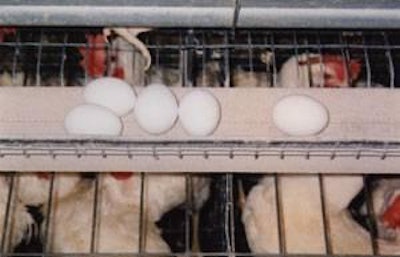
Three competing ballot initiatives have been pre-filed in the state of Washington over the use of cages to confine hens, with the intention of selecting one to be presented to voters at the November 2011 election. At this stage, the proponents of three measures have yet to collect the required 400,000 signatures, but following the precedent set in California in 2008, it is anticipated the electorate will be confronted with a ballot proposition, which will have profound implications for egg production in the state of Washington.
Initiative Measure 1130, Section 3, states:
- Notwithstanding any other provision of law, a farm owner or operator may not knowingly confine an egg laying hen in:
-A manner which prevents a hen from turning around freely, lying down, standing up, or fully extending her wings: or
-A cage that is stacked or otherwise placed on top of or below another cage confining one or more egg-laying hens - A person shall not knowingly sell or offer for sale any shell eggs for human consumption that is the product of an egg-laying hen confined in a manner contrary to the prohibition of Subsection (1).
In addition, Section 5, under definitions, "caged" means any closed device, (including what is commonly referred to as a “battery cage,” “enriched cage,” or “colony cage”) used to confine egg-laying hens such that the hens cannot freely enter and exit the device. "Fully extending her wings" means having at least one and one half square feet of individual useable floor space per egg-laying hen to fully spread both wings and "turning around freely" means turning in a complete circle without any impediment.
It would appear that Initiative Measure 1130 extends the intent of California Proposition 2 in that the ambiguity relating to “confinement” is eliminated. The proponents of the measure are clearly opposed to any confined alternative to conventional cages. The requirement that cages shall not be stacked is a further attempt to force production into aviary or litter systems. The requirement that “no person shall knowingly sell or offer for sale” would presume that introduction of eggs into the state of Washington from conventional cages would be disallowed. The space requirement of 169 inches2 is in 45% greater than the proposed 117 inches2 accepted by the American Humane Association for enriched colony cages. The AHA standard allowance was adopted on the advice of their scientific board of advisors in the U.S and specialists in the EU.
Egg producers in all Washington state are reviewing options, including a counter ballot proposition, establishing a Livestock Welfare Board, or a forceful but expensive program to oppose the initiative supported by the Humane Society of the United States.
Two other versions of the initiatives were pre-filed which incorporate slightly less draconian restrictions although with the similar intent or proscribing confined housing.


















